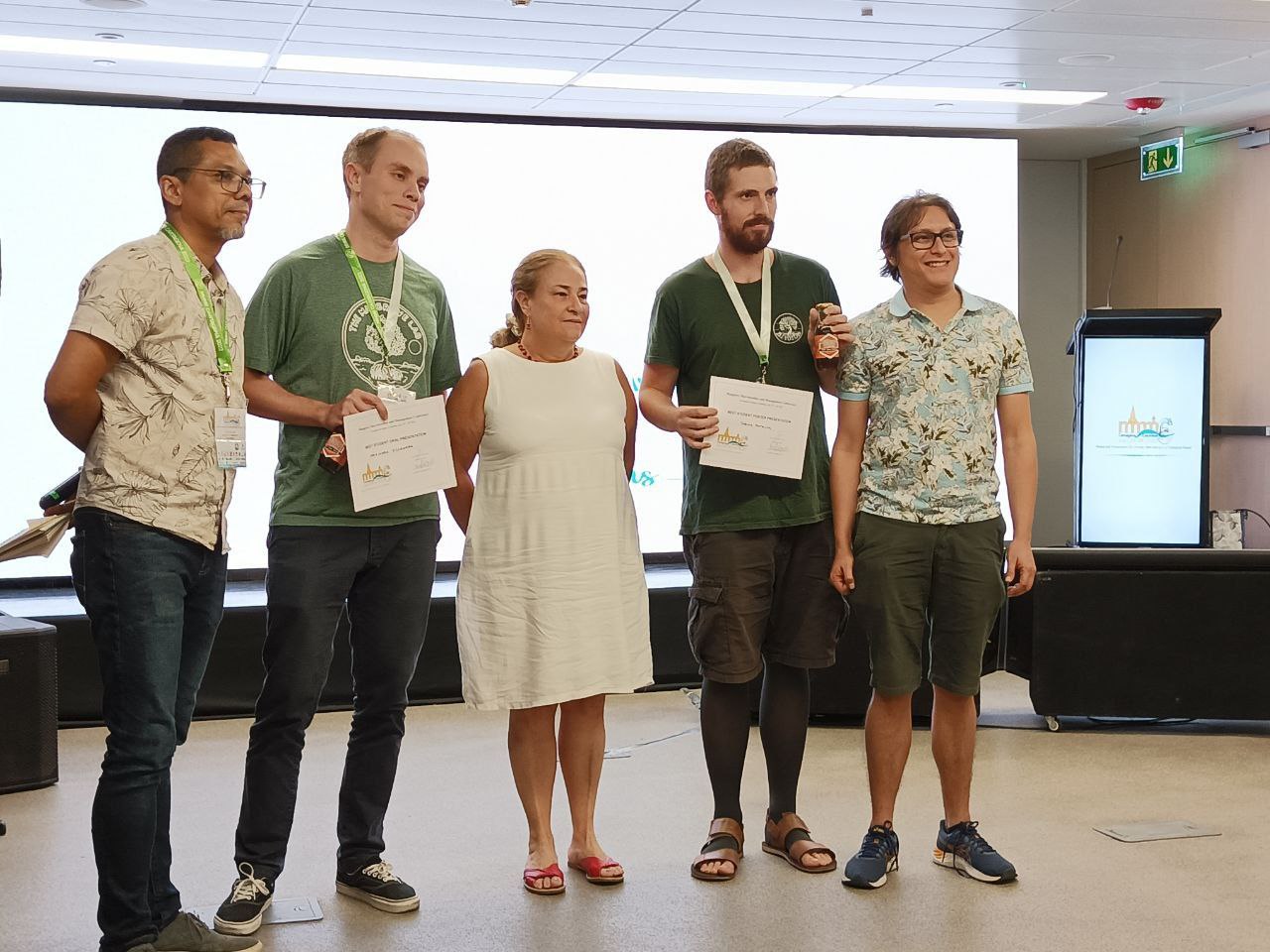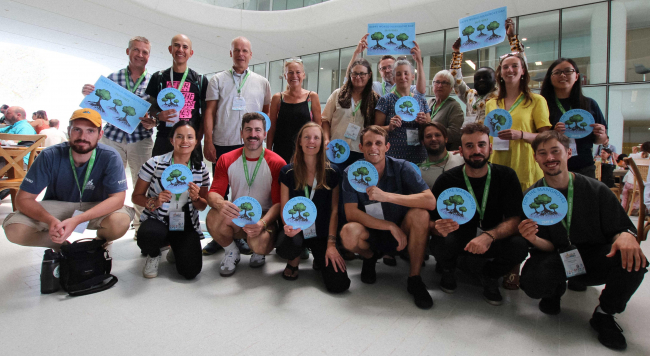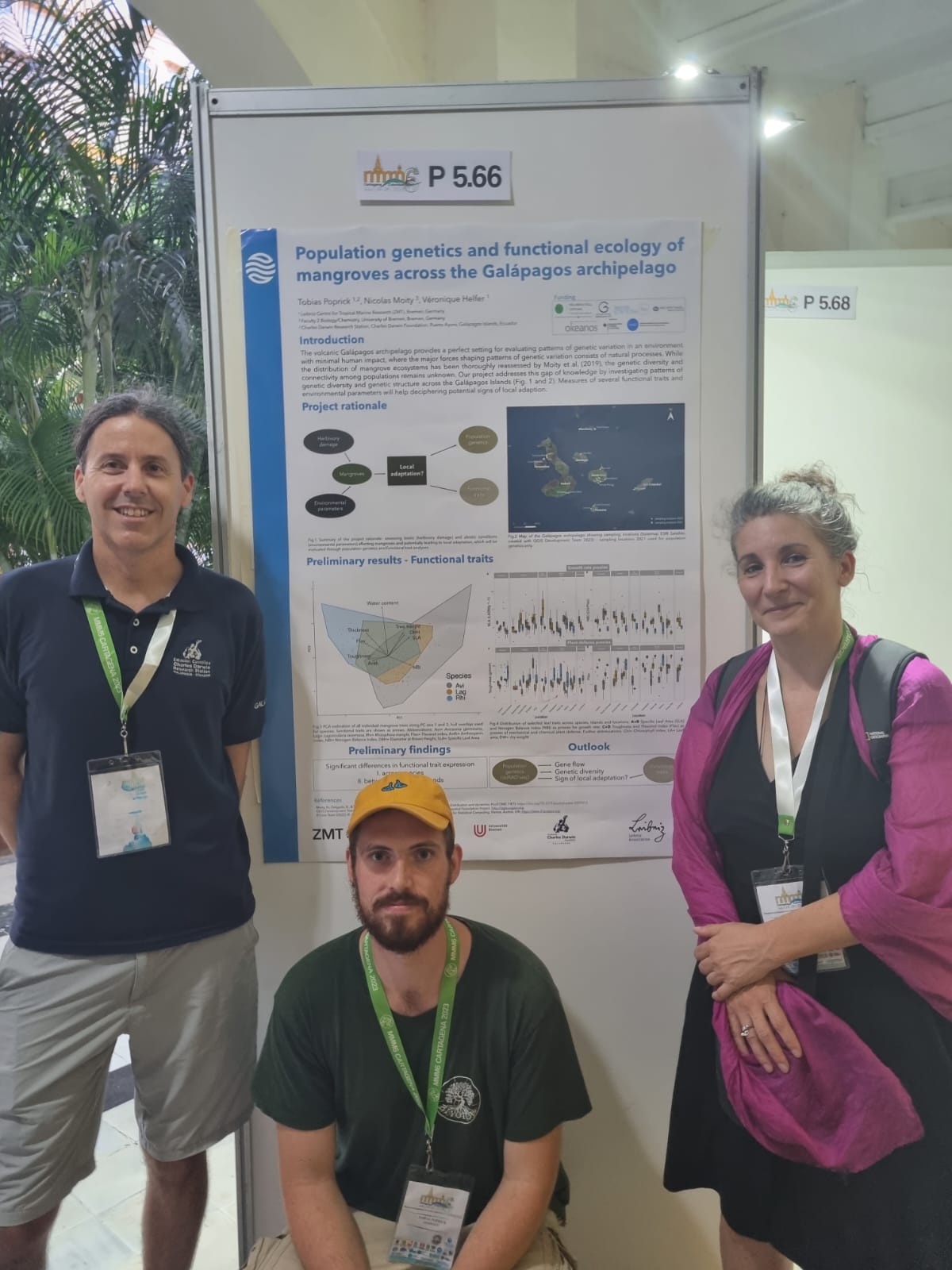23/08/2023 | ZMT scientists were out in full force at the world’s largest gathering of researchers and practitioners dedicated to the science, conservation and restoration of mangrove ecosystems. The sixth Mangrove Macrobenthos and Management conference (MMM6) under the overall topic of “Mangrove Ecosystems for Human Well-being in a Changing Planet” was held from July 24 to 28 at the Universidad de los Andes (Caribbean Campus) and the Universidad de Cartagena (San Agustin Cloister).
Twelve researchers from ZMT representing different career levels from master students to doctoral candidates and senior scientists attended the event which was the first conference in the series to be held in Latin America and the Caribbean, a region harbouring some of the tallest mangrove trees according to the latest maps of canopy height presented during the conference. The MMM6 provided a fitting stage for inspiring keynotes and presentations of the latest in mangrove research, thus, shining a light on the essential role mangroves play in our planet's ecological balance.
Diving deep into the heart of mangrove science, the conference showcased a diverse display of studies that ranged from blue carbon to mangrove ecosystem mapping using the latest technologies, but also mangrove restoration approaches, stressing the need for more involvement of the various stakeholders at play. Discussions on climate change resilience and the need for sustainable management strategies reflected the challenges and threats mangrove ecosystems currently face.
In total, ZMT presented 13 posters (four of them retained for lightning talks), and six oral presentations, a great opportunity to share the latest research findings. ZMT’s Tobias Poprick, a master student supervised by Véronique Helfer from the Mangrove Ecology working group and Nicolas Moity from the Charles Darwin Foundation (Islas Galápagos, Ecuador), impressed the organisers with his poster on “Population genetics and functional ecology of mangroves across the Galápagos archipelago” and was awarded the prize for best student poster.

Dr. Juan F. Blanco-Libreros (Universidad de Antioquia | CEMarin; member of the organizing committee of MMM6 & "Scientific Committee Chair" of MMM6), Mériladec Sillanpää (National University of Singaprore and winner of the award for best talk), Dr. Martha L. Palacios Peñaranda (Universidad Autónoma de Occidente; member of the organizing committee of MMM6), Tobias Poprick (ZMT) and David Sánchez (Universidad Nacional de Colombia and winner of best student - oral presentation at MMM5 in Singapore)
Tobias Poprick with his supervisors Nicolas Moity ( Charles Darwin Foundation) and Véronique Helfer (ZMT)
Prof. Ilka (Candy) Feller, a former member of ZMT’s scientific advisory board, was honoured with a well-deserved Lifetime Achievement Award. The ceremony was a very moving moment for everybody who knows Candy and her engagement for mangroves. Field excursions to nearby mangrove forests complemented the gathering which provided ample opportunities for networking and working on collaborative ideas for new scientific studies.
We asked ZMT participants to give us their low-down of the conference, the take-home messages and of what is in store for mangrove research in the foreseeable future:
Michael Kyei Agyekum, Doctoral Candidate:
"I was impressed by several aspects at MMM6. Dr. Edward Castaneda’s presentation on the effects of Hurricane Irma on mangrove forest structure in the Florida Everglades, USA truly captured my attention. His research demonstrated that hurricane disturbances significantly altered the mangrove forest canopy structure. However, the recovery of the vertical structure varied depending on factors such as resilience classes, species composition, and canopy height. This highlighted the complexity of the recovery process and the importance of considering various factors when assessing the impacts of hurricanes on mangrove ecosystems. I was also inspired by witnessing the use of innovative technologies and methodologies in mangrove research. Scientists showcased cutting-edge techniques like remote sensing, drone-based surveys, and advanced modeling tools. There was a positive trend towards interdisciplinary research in the mangrove community. Researchers from fields such as ecology, oceanography, hydrology, and climate science, collaborated to tackle complex issues in mangrove conservation and management. I was also excited to see the increased focus on blue carbon initiatives. Presenters discussed the role of mangroves as significant carbon sinks and their potential contribution to mitigating climate change. The integration of blue carbon concepts into national and international climate policies is a positive step towards recognizing the importance of mangroves in climate change mitigation strategies."
Mondane Fouqueray, Doctoral Candidate:
"For a first conference experience, MMM6 was an exciting and intense whirlwind of a week, packed with new information and networking. What a privilege it was to attend it alongside so many ZMT colleagues! As a newcomer focusing on the socio-ecological aspect of mangroves, it struck me how often the societal side of mangrove research was mentioned as “crucial” (the conference motto was: Mangrove Ecosystems for Human Well-Being in a Changing Planet), and yet how little space the social sciences occupied overall. But looking back to previous MMM conferences, this trend seems to be changing rapidly and I had several motivating discussions with fellow early career researchers working with native and indigenous communities around the world. I look forward to seeing how this part of mangrove research will develop in the coming years."
Dr Véronique Helfer, Senior Scientist:
"MMM6 was a great opportunity to discuss with colleagues worldwide and new collaborations will certainly arise from those exchanges, notably in the field of population genetics and eDNA applications for biodiversity monitoring. While we learned a lot about mangrove ecosystems in general – their worldwide distribution and changes thereof, restoration projects and blue carbon issues –, only few oral presentations were dedicated to mangrove ecology (such as the taxonomic and functional diversity of microbial communities, or species-specific studies). This lack of ecological studies is a tendency that is not unique to the conference but to mangrove research in general, as highlighted by the keynote presentation of Dan Friess from Tulane University in New Orleans. I am looking forward to MMM7, hoping that the mangrove scientific community will by then have started filling those gaps of knowledge for a better management of the mangrove ecosystems, at the community- and species-level."
PD Dr Tim Jennerjahn, Head of WG Ecological Biogeochemistry:
"MMM6 is the number one mangrove conference in the world and the community has grown largely over the years – so have the themes presented and discussed. Social sciences and conservation/restoration have grown in importance, generally the link between science and society became tighter. 'Blue Carbon' was one of the obvious dominant themes. The term stands for more than just carbon itself, it also stands for climate change mitigation and the motivation to preserve mangrove forests with all their valuable ecosystem functions and services. However, mangroves are not only relevant in terms of biodiversity, they also display a high chemical diversity. 'Blue Carbon' is not only C atoms, but the biomass and sediments contain organic matter consisting of diverse chemical compounds, which behave very different. This was hardly discussed during MMM6 and deserves more attention and research effort in the future. Nevertheless, over the past decade science and society have become much more aware of the important ecosystem functions and services provided by mangrove forests, and this is great!"
Tobias Poprick, Master Student:
"Being a part of MMM6 as a master student was an absolute delight and provided me with a great opportunity to immerse myself in the core essence of science exchange and networking. Sharing a vision for these amazing ecosystems with so many passionate people truly inspired and motivated me to continue my journey in the field of mangrove ecology. The conference’s overarching message emphasized the importance of not just advocating for systematic changes but actively participating in the process of transformation and cultivating the skill to critically evaluate one's own research, irrespective of age or academic degree. A key take-away from the event was the emphasis on avoiding ‘parachute science’ and instead, fostering deeper collaborations with local stakeholders. The conference urged us to align and integrate our research approaches and protection/restoration initiatives with the specific needs and desires of the local communities. This hopefully ensures that our efforts are more effective and relevant to the actual challenges faced by these ecosystems on site."
Mirco Wölfelschneider, Scientific Staff Member:
"The 6th Mangrove Macrobenthos and Management in Cartagena was my second conference in the series and it was a very nice opportunity to reconnect with colleagues I met at the MMM5 in 2019 on one hand, but also to build new connections with other mangrove scientists of various generations. Very inspiring talks in different fields of research have sparked new ideas on how the tracing of organic matter derived from mangroves has to become much more specific in order to gain a better understanding of budgets and dynamics in and beyond coastal systems. Especially, when facing the current blue carbon rush and the question of ‘How can our science help make blue carbon accounting more reliable and trustworthy?’. Overall, is was a great experience meeting so many fellow scientists carrying mangroves as close to their hearts, as we do. I’m looking forward to reconnecting with all these great people at the MMM7 in Japan and how we will manage to incorporate our new ideas into our science until then."
Professor Martin Zimmer, Head of WG Mangrove Ecology:
"The globally growing interest of societal and political actors and stakeholders in mangrove forests and their relevance as ecosystem service-providers, and particularly in the context of climate change-mitigation and -adaptation was well reflected by both the large number of participants and scientific contributions to the conference and the overall topical orientation of the event, focusing on global approaches and mapping these ecosystems and their services. While this mirrors a general trend in many ecological disciplines, and is highly important for communicating the messages to policy- and decision-makers that derive from science, local and regional, case-study need to underlie these global extrapolations and estimations. The Mangrove Ecology Group of ZMT will continue working on the local and regional scale (not omitting the global scale) through field and lab studies, particularly experimentally, on flora, fauna and microbiota and ecosystem processes, focusing on organic matter turnover and blue carbon sequestration and storage."






